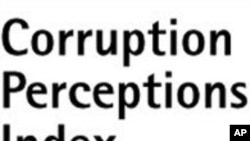The non-governmental organization Transparency International has issued its annual Corruption Perceptions Index. Somalia ranks as the most corrupt country at the bottom of the 180-nation list, with New Zealand as the nation perceived to be the least corrupt.
Transparency International's annual report offers a snapshot of how corrupt a country's government is perceived by international institutions including the World Bank, the World Economic Forum and the Asian and African Development Banks. This year's list includes 180 nations.
Patrick Berg is a program coordinator for Transparency International, which is dedicated to fighting corruption and raising public awareness of the problem.
"Overall we do not see a lot of changes to the last year's results," Berg said. "We see that there are quite a number of countries that still have a long way to go to increase public trust in their institutions."
He says corruption is the responsibility of everyone; civil institutions, corporations and governments, but that governments have a clear incentive to root out corruption.
"The interest of a government to reduce corruption is to provide better services the population overall, to provide better security, increase trust and that of course will also have a positive impact on business development, which again is profitable to the state," Berg said.
Much of Sub-Saharan Africa remains at the bottom of the list, and Berg says that is harder on the people.
"Where you find poverty, corruption usually hits people the hardest," Berg said. "In some of the more affluent countries, corruption may be a major problem, but it does not keep people from getting health care or clean water to their houses."
Berg says the that countries that have made consistent efforts to really improve their governance structures like Botswana, Mauritius and Cape Verde have improved their standing.
Transparency International Director of Policy and Research Robin Hodess says stability is important.
"We definitely see a trend over time where the system is stable, where there is good public investment and disclosure and active freedom of the press, this is where the countries improve," Hodess said.
Transparency International says the bright spot in 2009 is progress made in building a review mechanism to enforce the United Nations convention against corruption.
News
Annual Report Finds Sub-Saharan Africa Especially Hard Hit by Corruption

<!-- IMAGE -->





